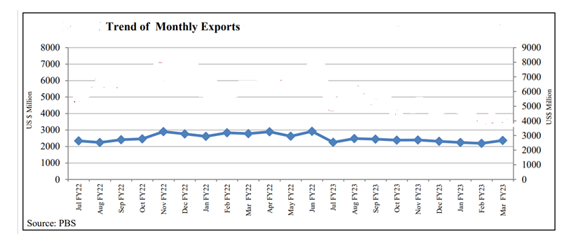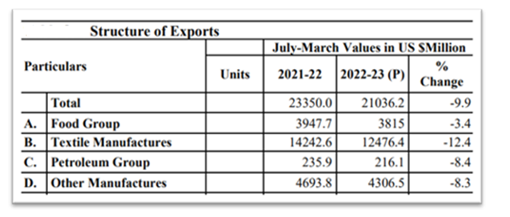INP-WealthPk
Ayesha Mudassar
The global economic slowdown along with disruptions in the export industry’s input supply has adversely affected the export performance in the outgoing fiscal year. Experts believe that prudent decisions along with their effective implementation are required to fix the export challenge. As per the Economic Survey of Pakistan 2022-23, exports declined by 9.9% during Jul-Mar FY2023 to $21.0 billion from $23.3 billion in the same period last year.

The decline in exports is mainly due to the inadequate performance of the textiles and food group. An analysis of group-wise data suggests that the major groups registered a negative growth. The food group growth decreased by 3.4 percent to

$3.8 billion during Jul-Mar FY2023 from $3.9 billion in the same period last year. Exports of the textile and petroleum groups witnessed a decline of 12.4% and 8.4% respectively during the period under review. Kashif Anwar, President of Lahore Chambers of Commerce and Industry (LCCI), mentioned numerous factors responsible for the country’s low exports. These include high import tariffs, limited availability of long-term financing, and structurally low productivity. In addition, he said the catastrophic floods and high energy costs had also negatively impacted the export-oriented industries. Chairman of Engineering Development Board Almas Hyder said the modern world was utilizing preferential trade agreements and diversification as prominent tools to secure market access and deepen regional and global integration.
“Fewer preferential trade agreements (PTAs) and commodity concentration have also been witnessed as major drivers of Pakistan's export challenges,” he added. As per the survey, the country’s major exports remain concentrated on three items, namely cotton manufactures, leather, and rice, accounting for around 68.1% of total exports during Jul-Mar FY2023. Talking about the measures to make the exports competitive, World Bank senior economists Ashraf Ghumman and Derek HC Chen said the initial priority should be to ease up import restrictions.
According to them, upgrading the regulatory environment, removing commodity concentration, and helping firms to comply with the international standards were essential for enhancing exports. Focusing on collaboration and innovation would lead to the development of new and diversified products, better suited to the demand of global markets. Furthermore, the World Bank's report “Pakistan Development Update: Reviving Exports” suggests that the federal and provincial authorities need to design and implement a policy reform agenda in a coordinated manner along with the broadest support from the public-private sector for export revival.
Credit: INP-WealthPk



